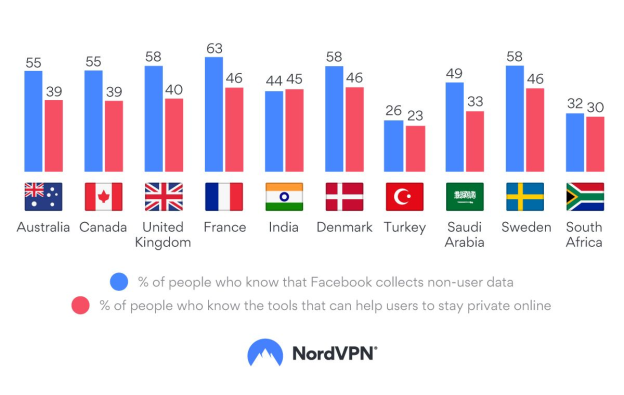Australia is ranked amongst the top ten countries which have no idea how their data is collected by Facebook.

Half of Australians unaware
Ways in which Facebook collects your data, even if you don’t have an account.
In April of 2018, Facebook’s CEO Mark Zuckerberg confirmed that the social network collects data from people online even if they don’t have a Facebook account.
Even though this might sound like old news, research by the leading virtual private network NordVPN shows that a lot of people are still unaware of this privacy issue.
To address the matter, NordVPN has listed 10 countries whose residents have the least knowledge about the kind of data Facebook collects.
Australia is one of those countries: only 55% of respondents from the country knew about the possibility of their data being collected.
“However, many people avoid using it because of the numerous data leak scandals the company had in the past. Unfortunately, even if you are not an active user or don’t even have an account, your data is probably still not as private as you would expect,” explains Daniel Markuson, a digital privacy expert from NordVPN.
COUNTRIES WITH LACK OF KNOWLEDGE
The countries whose residents took the National Privacy Test and turned out to be the least informed about the issue include:
- Australia (55%)
- Canada (55.2%)
- United Kingdom (57.7%)
- France (62.6%)
- India (43.8%)
- Denmark (57.7%)
- Turkey (26.1%)
- Saudi Arabia (48.5%)
- Sweden (57.8%)
- South Africa (31.8%).

Interestingly, residents of the same countries were the least aware of the tools that can help users to stay private online (like VPNs, proxy servers, TOR browser, etc.)
HOW FACEBOOK COLLECTS DATA
Even if you’re not using it.

Facebook can collect data from non-users in two ways: from their browsing history and their friends’ activity.
The company has officially explained only one of these options.
There are numerous sites on the internet that use Facebook’s plugins (the “Like” or “Share” buttons), logins (which help users register on certain websites using their Facebook account), and ads analytics tools (which help website owners to understand the effectiveness of their ads on Facebook).
Facebook collects data on everyone who visits websites like these, whether they’re a registered user or not.
The non-user data is less valuable to the social network, because Facebook doesn’t sell targeted ads based on that browsing history like it does if the user is registered. But Facebook can still use that information, which includes the user’s IP address, to show ads encouraging people to join Facebook.
The other way Facebook gets information about non-users is from its contact upload feature.
When people sign up for Facebook, many of them are encouraged to upload their contacts to the service so they can find other people to connect with. It’s likely, though, that some contacts in a user’s phone aren’t on Facebook — but he or she is still giving this info over to the company.
Depending on how detailed users are with their contacts, this data could include a lot more than just a phone number — it could be the name, surname, workplace, email, or even address.
STEPS TO BECOME MORE PRIVATE
“You may think it’s not that big of a deal if a social network knows your IP address, workplace, or telephone number. But what if a cybercriminal does? Considering Facebook’s sad history of data leaks (including the latest, which happened in April 2021), we can never be sure where our data may end up once we give it to Facebook,” Markuson explains.
But, if you use Facebook regularly, you can still do something to stay more private:
- Follow security protocols on the platform. Go to your Facebook account settings and go through the “Security and Login” as well as “Privacy” settings. Change any of the settings that seem to be a threat to your privacy.
- Don’t reuse passwords. With the multiple data breaches Facebook has had, it’s more important than ever not to reuse passwords. This is because any passwords that are compromised through Facebook will put all other accounts that share the same password in jeopardy.
- Don’t overshare. Facebook can’t leak any data if a person doesn’t share that data online. Make sure that the photos you post cannot be used for malicious purposes. For example, don’t share photos that can help criminals to identify where your home is or what your holiday plans are so they don’t know when you are away.
- Don’t sign in with Facebook. Third-party apps are a huge security hole for Facebook. So, don’t log in to other apps or websites using Facebook, as they will then have direct access to all of your data.
Source – https://tottnews.com/2022/02/22/australians-unaware-facebook-data/
